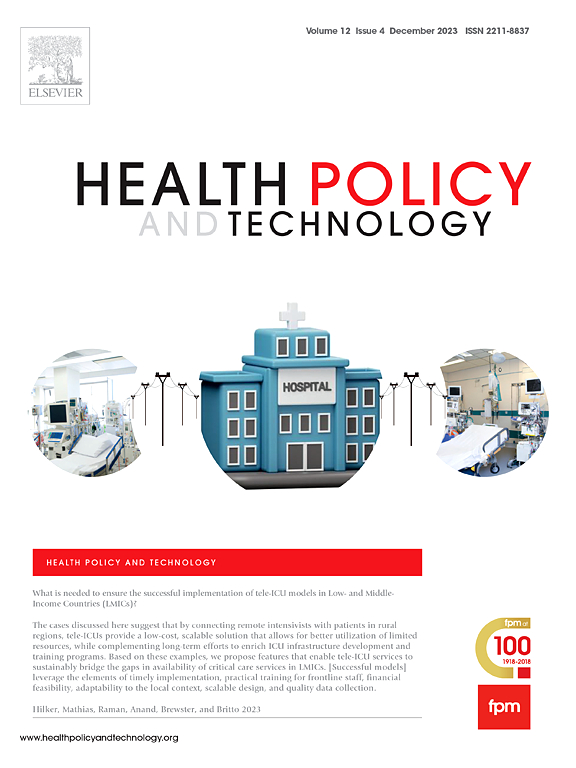HTA between theory and practice: Exploring boundary work in broadening HTA For MedTech governance
IF 3.7
3区 医学
Q1 HEALTH POLICY & SERVICES
引用次数: 0
Abstract
Objectives
In this paper, we explore the social and political practices involved in broadening health technology assessment (HTA) for medical technology (MedTech) governance. We take as our case study the Dutch HTA Methodology 2021–2024 Program, which aimed to broaden HTA methodologies to the assessment of MedTech, and in so doing, broadened the stakeholders involved. Our research question is as follows: How do stakeholders involved in the program interpret HTA (methodologies) for MedTech, and how do they envision multi-stakeholder collaboration on HTA (methodologies)?
Methods
We conducted 19 semi-structured interviews with program participants, including committee members and grant applicants. We also spent 120 hours observing program meetings as non-participants and conducted document analysis.
Results
Using boundary work as a sensitizing concept, we describe how broadening the actors involved both introduced and exposed different interpretations of HTA and HTA methodologies for MedTech. We describe three ways in which participants envisioned (potential) integration of these interpretations, which we term collaboration hybrids. Each collaboration hybrid encapsulates a way of navigating across boundaries.
Conclusions
Our findings highlight that attempts to broaden HTA into a more prominent aspect of MedTech governance challenge the boundaries of what is understood as proper HTA. We argue that reflecting explicitly on these different interpretations, and the diverse ways to integrate them, increases the relevance of the HTA methodologies developed and the collaborations initiated in the governance of MedTech through HTA.
理论与实践之间的HTA:探索医疗技术治理中拓宽HTA的边界工作
在本文中,我们探讨了扩大医疗技术(MedTech)治理的卫生技术评估(HTA)所涉及的社会和政治实践。我们以荷兰HTA方法2021-2024计划为例进行研究,该计划旨在将HTA方法扩展到医疗技术评估中,从而扩大了所涉及的利益相关者。我们的研究问题如下:参与项目的利益相关者如何解释MedTech的HTA(方法),以及他们如何设想多方利益相关者在HTA(方法)上的合作?方法我们对项目参与者进行了19次半结构化访谈,包括委员会成员和资助申请人。我们还花了120个小时作为非参与者观察项目会议,并进行文件分析。结果使用边界工作作为敏感化概念,我们描述了如何扩大参与者,既引入和暴露了医疗技术对HTA和HTA方法的不同解释。我们描述了参与者设想(潜在)集成这些解释的三种方式,我们称之为协作混合。每种混合协作都封装了一种跨边界导航的方式。我们的研究结果强调,试图将HTA扩大到医疗技术治理的一个更突出的方面,挑战了什么是正确的HTA的界限。我们认为,明确反思这些不同的解释,以及整合它们的不同方式,增加了通过HTA开发的HTA方法和在医疗技术治理中发起的合作的相关性。
本文章由计算机程序翻译,如有差异,请以英文原文为准。
求助全文
约1分钟内获得全文
求助全文
来源期刊

Health Policy and Technology
Medicine-Health Policy
CiteScore
9.20
自引率
3.30%
发文量
78
审稿时长
88 days
期刊介绍:
Health Policy and Technology (HPT), is the official journal of the Fellowship of Postgraduate Medicine (FPM), a cross-disciplinary journal, which focuses on past, present and future health policy and the role of technology in clinical and non-clinical national and international health environments.
HPT provides a further excellent way for the FPM to continue to make important national and international contributions to development of policy and practice within medicine and related disciplines. The aim of HPT is to publish relevant, timely and accessible articles and commentaries to support policy-makers, health professionals, health technology providers, patient groups and academia interested in health policy and technology.
Topics covered by HPT will include:
- Health technology, including drug discovery, diagnostics, medicines, devices, therapeutic delivery and eHealth systems
- Cross-national comparisons on health policy using evidence-based approaches
- National studies on health policy to determine the outcomes of technology-driven initiatives
- Cross-border eHealth including health tourism
- The digital divide in mobility, access and affordability of healthcare
- Health technology assessment (HTA) methods and tools for evaluating the effectiveness of clinical and non-clinical health technologies
- Health and eHealth indicators and benchmarks (measure/metrics) for understanding the adoption and diffusion of health technologies
- Health and eHealth models and frameworks to support policy-makers and other stakeholders in decision-making
- Stakeholder engagement with health technologies (clinical and patient/citizen buy-in)
- Regulation and health economics
 求助内容:
求助内容: 应助结果提醒方式:
应助结果提醒方式:


